The Red Meat Industry Services (RMIS) Traceability Showcase that took place this week in Pretoria marked a defining moment for South Africa’s livestock industry. Leaders, government representatives and farmer organisations gathered to unveil a traceability platform designed to decentralise data and rebuild trust across the entire value chain.
Chief executive officer of RMIS, Dewald Olivier, emphasised the significance of this collective milestone, acknowledging the long journey that began in 2019 when four organisations agreed to put aside differences to build a unified future for the red meat industry.
“This is for the entire livestock value chain from cattle and sheep farmers to abattoirs and auctioneers; we had to change our mindset and take the first step instead of waiting for the perfect moment,” Olivier said.
From concept to collaboration
Chief operating officer at RMIS, Phillip Oosthuizen, reflected on more than a decade of attempts to establish a national traceability system.
“I’ve attended three or four launches for traceability since 2010; hopefully, this will be the last and the one that works. Over the past 18 months, RMIS has worked with multiple stakeholders to create a platform that is flexible, farmer-driven and inclusive of all livestock sectors, from red meat to dairy and pork.
📢 Stand Up, Be Seen, Be Counted
We want to provide you with the most valuable, relevant information possible. Please take a few minutes to complete this short, confidential survey about your farming practices and challenges. Your feedback helps us tailor our coverage to better support the future of agriculture across Mzansi.
Related stories
- Protect your livestock: Dos and don’ts for the rainy season
- SA’s agriculture budget is too little to transform, says Sibiya
- Foot-and-mouth disease: What farmers need to know
- Stray, unmarked livestock a death trap on Mzansi’s roads
“Whatever we develop must create trust from the start. We cannot force compliance; we have to build confidence. And when it comes to data, your data remains yours,” he said.
Oosthuizen said the move toward decentralisation represents a decisive shift away from traditional, centralised traceability systems. RMIS’s model uses an agile development approach, allowing small-scale testing and adaptation every two weeks.
“We didn’t go the route of building one massive, centralised system that dictates terms; instead, we built small, functional parts, tested them in the field, and improved based on farmer feedback. That’s how you build trust and relevance.
“The future lies in sharing accurate, secure data across the value chain. That’s how we create export readiness and consumer confidence,” Oosthuizen said.
Ensuring trust and transparency
Meanwhile, minister of agriculture John Steenhuisen praised the initiative as a critical partnership between government and industry that positions South African livestock products for global competitiveness.
“Traceability is not a luxury; it’s essential. Our international consumers demand it, and without it, we cannot assure markets of our disease control or product quality.
“Many government-led systems have failed because they didn’t account for the diversity of our agricultural landscape. This one does. It’s built from the ground up, by the sector, with government as a partner, not a controller,” Steenhuisen said.
Addressing concerns about data misuse, he reassured producers that there’s no desire for the government to control the data.
“The data belongs to the industry. What this allows is responsible sharing so that we can collectively monitor animal movement, control diseases like foot-and-mouth, and unlock new export markets,” he said.
READ NEXT: R91m in energy relief protects farmers against power cuts

















